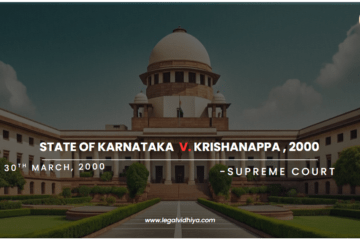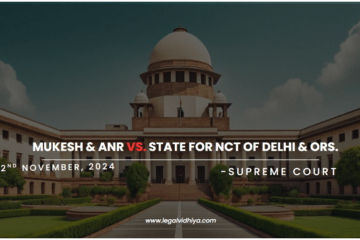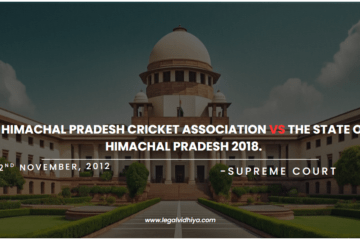
| CASE: | State of Maharashtra vs Yadav Nathhuji Kohachade |
| Equivalent Citation: | 2000 (5) Bom CR 743, 2000CriLJ 959 |
| DATE OF JUDGMENT: | 19 July, 1999 |
| COURT | Bombay High Court |
| CASE TYPE: | Criminal Revision Petition |
| PETITIONER: | State of Maharashtra |
| RESPONDENT: | Yadav Nathhuji Kohachade |
| BENCH: | (1 Judge) J Patel. |
FACTUAL MATRIX OF THE CASE:
The short realities which prompted the capture of the non-candidate/denounced, Yadav child of Nathuji Kohachade is that while P.S.I. Anil Lokhande was exploring Wrongdoing No. 194/99, he got a call from the non-candidate/accused on 18-6-1999, as per which, a gathering was held and the Cop was offered a pay off of Rs. 7,00,000/- for not including one Banty Uike and the non-applicant/accused. Instead of accepting the bribe, the Police Officer appears to have reported the matter to the Anti-Corruption Bureau, which set up a trap in which the non-applicant/accused was caught offering bribe to the Police Officer in question. The ACB registered Crime No. 3119/99 under the Prevention of Corruption Act’s Section 12 against the non-applicant accused. The non-applicant accused person then appeared in front of the Special Judge to ask for his remand so that the investigation could begin. The Special Judge at first conceded Police Custody Remand for a time of seven days, i.e., till 25-6-1999. The non-applicant/accused was brought before the “Special Judge” on June 25, 1999, and additional police custody was requested, which was granted until June 28, 1999. In the interim, the accused/non-applicant moved for bail in Crime No. 3119/99. After the Police Custody Remand of the non-applicant was finished, he was produced before the Special Judge on 28-6-1999. As no further solicitation for police custody was there, he came to be remanded to judicial custody and was shipped off to the central Jail, Nagpur.
On 28.06.1999, the Investigating officer in another case moved an application before the Judicial Magistrate First Class (hereinafter JMFC) regarding granting him the police custody of the non-applicant/accused for the purpose of investigation. JMFC, on the production of application by the investigating officer regarding the demand for police custody of the accused, has sent a request to the Special Judge, Nagpur for consideration. In the meantime, for the purpose of getting the custody of the accused, the prosecution filed, before JMFC, an application for the production of the accused before the court. The court of JMFC acted on the application seeking a production warrant; and ordered for the production of the accused before the court. Pursuant to this production warrant the investigating officer took over the custody of the accused from the jail; and prayed before the JMFC for police custody of the accused for the purpose of investigation; and the JMFC granted the police custody for 14 days.
Having aggrieved by this order the non-applicant/accused filed a Criminal Revision application before the Court of Session. He challenged the orders delivered by the JMFC for the police custody of the accused. The court of Additional Session Judge, after hearing both the parties, ordered for the suspension of the remand, which was given by the JMFC, for two days.
LEGAL ISSUE:
The entire controversy prompting the capture of the non-applicant for the situation emerged in light of the fact that the non-applicant/accused was confined in jail and the prosecution didn’t find proper way to obtain his presence under the watchful eye of the court for remand.
ARGUMENT OF THE LEARNED COUNSEL OF THE ACCUSED:
Mr. Manohar, learned Guidance showing up for the non-applicant presents that the entire strategy embraced by the arraignment was unpredictable and it denied procedural equity to the non-candidate blamed being in opposition to the express method gave under the CrPC and, in the conditions, the Court of Sessions was legitimate in passing the interim order. In addition, it is argued that the Court of Sessions is now in charge of the case, and since the Court of Sessions has already disposed of the contempt proceedings initiated by the wife of the non-applicant accused, the Court of Sessions is free to decide the merits of the application filed by the non-applicant accused. The learned counsel for the non-applicant/accused contends that the Court may, at most, direct the Revisional Court to expeditiously resolve the matter and that the non-applicant/accused is prepared to proceed immediately with the case before the Court of Sessions.
ARGUMENT OF THE PUBLIC PROSECUTOR:
Mr. Deshpande, an experienced Additional Public Prosecutor, has submitted that Smt. Kusum Kohachade, the spouse of the non-applicant, moved a contempt petition under the watchful eye of this Court which came to be enlisted as Contempt Petition No. 5/99 was dismissed on July 16, 1999, so neither the Court of Sessions nor this Court are hampered in their ability to consider the parties’ applications. Even though the proceedings before the Revisional Court are also moving forward daily, it is argued that this Court should hear the case and decide it on its merits to put the controversy to rest.
JUDGMENT:
Section 167 of the Criminal Procedure Code is the relevant section that must be taken into consideration for the purposes of this case. The officer in charge of the police station or the police officer making the investigation if he is not below the rank of sub-inspector, shall forthwith transmit to the nearest Judicial Magistrate a copy of the entries in the diary and seek his further detention whenever any person is arrested and detained in custody and it appears that the investigation cannot be completed within the 24 hours fixed by Section 57 and there are grounds for believing that the accusation or information is well-founded. In accordance with section 167(2), the Magistrate to whom an accused person is forwarded may periodically authorize the detention of the accused for a period of not more than fifteen days in total, regardless of whether he has or does not have jurisdiction to try the case. Additionally, he may direct the accused to be transferred to a magistrate with such jurisdiction if he believes that further detention is unnecessary and he lacks the authority to try the case or commit it for trial. The stipulation to Area 167(2) further gives in what way and to what period the blame can be confined.
For the purpose of this case, section 267(1)(a) is relevant.
“267. (1) Whenever, in the course of an inquiry, trial or other proceedings under this Code, it appears to a Criminal Court-
(a) that a person confined or detained in a prison should be brought before the Court for answering to a charge of an offence, or for the purpose of any proceedings against him, or
s(b) ….
the Court may make an order requiring the officer-in-charge of the prison to produce such a person before the “Court for answering to the charge or for the purpose of such proceedings or, as the case may be, for giving evidence.”
JUDGMENT:
At this state, I might want to explain that in such cases, it is in every case better for the indictment in the wake of getting a request under segment 267 of the Criminal Methodology Code to move toward the Court compelled a convict or a denounced is restricted or kept in jail for looking for consent of the concerned Court, on the premise that the care of the blamed is expected for the reasons for procedures forthcoming under the steady gaze of a Court of equipped juris expression and depict the idea of the procedures as for this situation, looking for remand of the charged, i.e., his police guardianship for the motivations behind examination in Wrongdoing No. 194/99, and upon such an application, the concerned Court, under whose order the accused is confined or detained in the prison, may direct the jail authorities to produce the accused in accordance with the order passed by the competent Court under section 267 of the Criminal Procedure Code, with or without condition relating to the proceedings that require the accused to be produced before it. This would stay away from pointless discussion and in such cases, a warrant of creation gave by an able Court for the said motivation need not be returned back by the official responsible for the jail, in light of the fact that on the off chance that the official accountable for jail swears off completing the Court’s requests gave under segment 267 of the Criminal Method Code, the indictment will then need to go through a similar activity and, consequently, before such a request under area 267 of the Criminal Strategy Code is looked to be upheld, assuming that the arraignment is as of now furnished with the assent of the concerned Court compelled an individual who is expected to be captured is bound or kept in the jail, the official responsible for the jail should conform to the said request.
“267. (1) Whenever, in the course of an inquiry, trial or other proceedings under this Code, it appears to a Criminal Court-
(a) that a person confined or detained in a prison should be brought before the Court for answering to a charge of an offence, or for the purpose of any proceedings against him, or
(b) …..
the Court may make an order requiring the officer-in-charge of the prison to produce such person before the “Court for answering to the charge or for the purpose of such proceedings or, as the case may be, for giving evidence.”
“267. (1) Whenever, in the course of an inquiry, trial or other proceedings under this Code, it appears to a Criminal Court-
(a) that a person confined or detained in a prison should be brought before the Court for answering to a charge of an offence, or for the purpose of any proceedings against him, or
(b) …..
the Court may make an order requiring the officer-in-charge of the prison to produce such person before the “Court for answering to the charge or for the purpose of such proceedings or, as the case may be, for giving evidence.”
written by Tarun Verma, Rajiv Gandhi National University of Law, Punjab




0 Comments